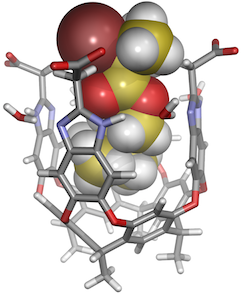Research in Organic Chemistry at UC Riverside spans the whole range of topics in modern organic chemistry, from biological and medicinal chemistry to natural product synthesis, the discovery of new reactions and materials to the physical organic chemistry of reaction mechanisms. In addition, our faculty have interests in supramolecular self-assembly, the creation of functional materials and study of reactivity at the solid interface. We have active collaborations with other disciplines in chemistry (such as Analytical, Biological, Inorganic and Physical) as well as other departments at UC Riverside such as Chemical Genomics, Materials Science and Engineering, Biochemistry, Plant Biology and Entomology. Please follow the links below to learn more about the individual research groups in the organic chemistry program at UC Riverside.
Subjects of first-year organic graduate courses include modern organic reactions and reagents and their mechanistic pathways, structure and bonding in organic compounds, kinetics and mechanism of organic reactions, synthetic organic chemistry and spectroscopic identification of organic compounds. Weekly seminars in both the department and the research group familiarize students with current research topics.
Faculty Research Descriptions:
Ana Bahamonde
We focus on the design and investigation of asymmetric catalytic reactions. We use physical organic chemistry tools, organometallic complexes and visible light to enable challenging bond disconnections.
Matthew Casselman
My scholarly activity focuses on implementing and assessing the effectiveness of evidence-based instructional practices, primarily in large-enrollment organic chemistry courses.
Hill Harman
Synthetic Inorganic, Organometallic and Organic chemistry: ligand and catalyst design; organocatalysis; electrocatalysis; structure, bonding, and reactivity of the transition and main group metals; energy and green chemistry.
Richard Hooley
Synthetic Organic, Inorganic and Supramolecular chemistry. Our projects include: the synthesis of biomimetic supramolecular constructs capable of selective molecular recognition; synthesis of new water-soluble catalysts and host molecules; dynamic NMR studies of host guest interactions; biosensors based on synthetic receptor molecules.
Kevin Kou
Synthetic Organic Chemistry, Organometallic Chemistry, catalysis and its applications to synthesis, natural product synthesis, and mechanistic investigations.
Catharine Larsen
Organic and Organometallic chemistry; discovery of new multicomponent metal-mediated reactions and their applications to the synthesis of complex molecules.
Vince Lavallo
Synthetic Organometallic, Inorganic and Organic chemistry. The preparation of novel transition metal and non-metallic catalysts for a variety of industrially important chemical transformations. Ligand design, asymmetric catalysis, new reaction methodology and carborane chemistry.
Jocelyn Millar
Identification and synthesis of insect pheromones and related behavior modifying chemicals; identification of Kairomones; development of applications of pheromones and related compounds for agricultural crop protection.
William Neary
The Neary group at the University of California, Riverside specializes in the metathesis polymerization of nonconventional substrates. We aim to overcome current state-of-the-art polymerization limitations through rational monomer design and systematic catalyst-monomer pairing. The successful generation of these microstructures, once thought to be inaccessible, will lead to materials with applications in sensing, recycling, and lithium-ion battery formulations.
Michael Pirrung
Chemical biology, synthetic organic chemistry, nucleic acids, combinatorial chemistry; photochemistry.
Timothy Su
Organic-focused projects in the Su Lab involve the chemical synthesis of organic electronic materials such as π-conjugated molecules and polymers. In some projects, chemical synthesis is followed by measurement in the lab's homebuilt STM-BJ instrument, where quantum transport characteristics in molecular wires are dictated by fundamental concepts from physical organic chemistry.
Christopher Switzer
Design, synthesis and characterization of nucleic acid variants with new properties for molecular recognition, catalysis and replication.
Kathryn Uhrich
Coming Soon!

